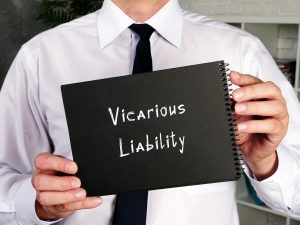What Is Vicarious Liability?
 The legal doctrine of vicarious liability is a form of secondary liability, meaning that one party can be held accountable for the acts of another. Vicarious liability commonly arises out of the legal responsibility employers have for the actions of their employees. In other words, when an employee’s negligence or irresponsibility during the scope of their employment causes an injury, their employer may also be held liable. Throughout history, various legal terms, such as respondeat superior, principal and agent, and master and servant, have all been used to place vicarious liability on third parties that retained the right to control the person at-fault for an accident. Since employers carry comprehensive insurance policies and sufficient financial resources, establishing vicarious liability can help victims obtain total compensation for their injuries.
The legal doctrine of vicarious liability is a form of secondary liability, meaning that one party can be held accountable for the acts of another. Vicarious liability commonly arises out of the legal responsibility employers have for the actions of their employees. In other words, when an employee’s negligence or irresponsibility during the scope of their employment causes an injury, their employer may also be held liable. Throughout history, various legal terms, such as respondeat superior, principal and agent, and master and servant, have all been used to place vicarious liability on third parties that retained the right to control the person at-fault for an accident. Since employers carry comprehensive insurance policies and sufficient financial resources, establishing vicarious liability can help victims obtain total compensation for their injuries.
Personal Injury Cases That May Involve Vicarious Liability
A fundamental element that separates this legal doctrine from other forms of liability is the lack of necessary direct participation. For vicarious liability to arise, the third party is not required to be present during the accident. Instead, liability is based on the negligent actions of an employee. The most common types of personal injury lawsuits where vicarious liability may be applied include:
- Employer Liability: The employer-employee relationship is the most well-established form of vicarious liability. Employers are obligated to ensure that their employees act safely. Employers can be held accountable for injuries caused by employees acting within the scope of their employment. The legal theory respondeat superior holds employers responsible for careless acts provided that the conduct is a reasonably foreseeable occurrence of that individual’s employment. For example, if a driver smashes into a pedestrian while delivering a pizza, the parlor could be held vicariously liable.
- Parental Liability: Parents and guardians can be held legally responsible for their children. Parents are typically held accountable when their failure to act contributes to their child’s negligence. For example, suppose a teenager stays out past curfew while driving the family minivan and causes an accident. In that case, their parents may be considered vicariously liable for the resulting injuries.
- Medical Malpractice: In many instances, doctors are not technically employees of the hospitals where they admit patients or maintain staff privileges. While a hospital may attempt to downplay its responsibility to direct doctors, every hospital has a legal obligation to ensure that non-employee physicians provide patients with the highest quality of care. Hospitals can also be vicariously liable for other employees’ substandard care.
Contact The Dietrich Law Firm P.C.’s Expert Vicarious Liability Lawyers In Western New York
Businesses can be held responsible for accidents caused by their employees acting within the scope of their employment when those actions were meant to further the company’s interests. You may be eligible to pursue monetary compensation from a negligent employee and their employer based on the legal doctrine of vicarious liability. Retain Jed Dietrich, Esq., famed as an American Institute of Trial Lawyers Litigator of the Year, and his veteran team to fight in your corner every step of the way. The Dietrich Law Firm P.C.’s elite team of lawyers is available twenty-four-seven by dialing 716-839-3939 or by completing our online consultation form.
 Buffalo Personal Injury Lawyer News
Buffalo Personal Injury Lawyer News

